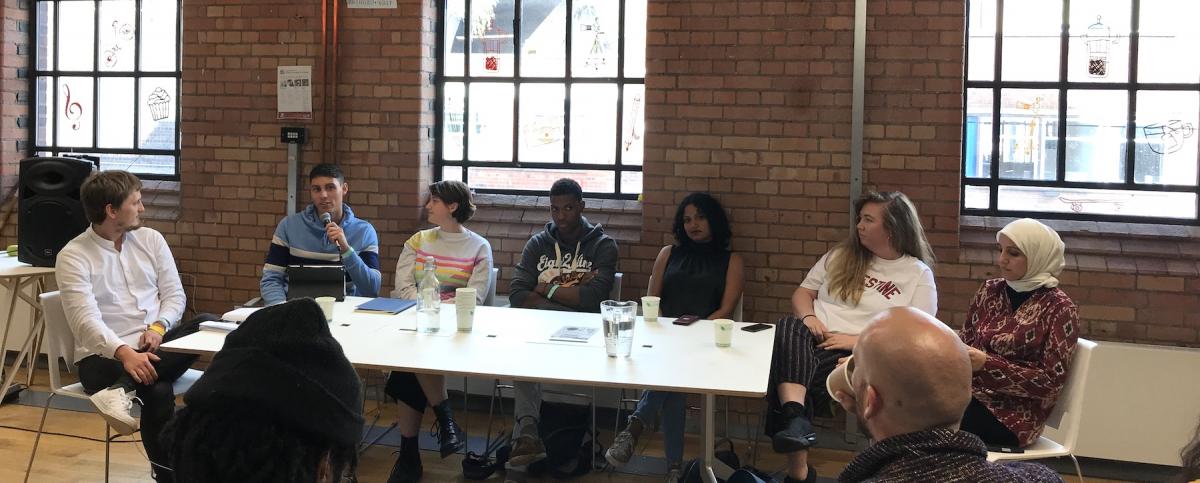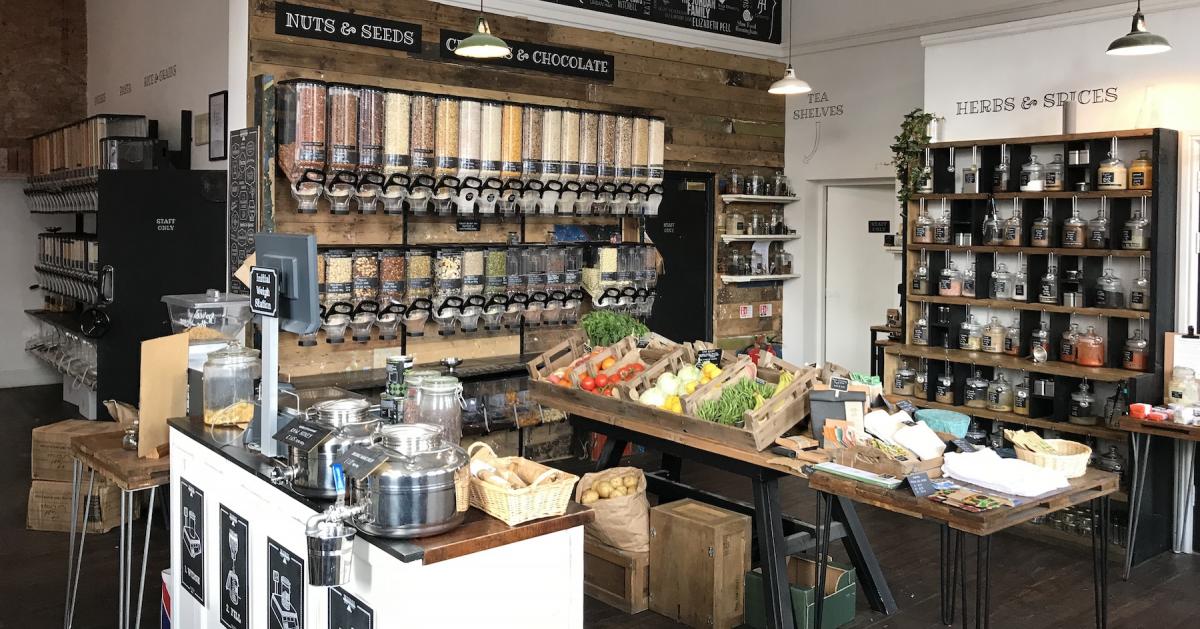The future is flatter, lessons from Laloux and Birmingham

The World Transformed is a festival of ideas, encompassing the breadth of transformative political ideas and shifts happening beyond the pantomime of parliamentary fights. In the six weeks since I went to TWT Birmingham I’ve started and abandoned three different TWT write-ups, struggling to sum-up such a rich tapestry of thinking in the midst of wider discussions around the world. But fresh from reading Frédéric Laloux, Reinventing Organisations, I’ve tried my best to sum it up, before arguing that change is not just needed, and inevitable, it’s already here and thriving. First the headlines from TWT:
- There is an emerging, yet clear, new economics of the left, in a way there wasn’t post-2008-crash or during Occupy Wall Street’s response, or even at the 2015 general election. It’s inspired by a doughnut and you don’t need an economics degree to understand it. Kate Rowarth’s Doughnut Economics puts human and social limits to economic growth (the inner ring) on a level with ecological and climate constraints (the outer ring) – everything else is fatty, sugary goodness.
- The climate emergency is now driving the call for change, pulling decades of often fringe discussions about rebuilding our national and global economies, hard into the mainstream. Regardless of their political leaning, no-one who understands climate science seems to deny we need radical and urgent change to avoid a terrifying future.
- In order to be supported, the change the climate-crisis demands should be worker- and community-led, and anti-imperial. There are plenty of market-led solutions to climate change waiting in the wings, but the decimation of British industry and mining in the 80s – and its ripples still decades later – is a sober lesson in what happens when economic policy ignores societal needs. Meanwhile, Bolsonaro lets the Amazon burn, using the West’s lack of insight about our colonialist legacies as a rallying cry.

The doughnut (below, taken from Kate's website) is a remarkably resilient concept as it frames multiple questions and debates: green-growth vs no-growth, reform vs overthrow capitalism; stop Brexit or stop letting it dominate and divide us; nationalise banks or limit their size; how to respond to the failures of our past; whether to adopt the Singapore model of abolishing private land ownership or the European model of rent caps & lifelong tenant protection and Scottish/Berlin-styled Community land/housing reclamation; and on and on. If the idea or model can both serve human and planetary needs - and is achievable - then it seems to have a place in the ring.
Running through all the sessions – was a sense that change is inevitable, with or without us. In other words: change will either come before climate collapse, or be forced in its aftermath. We either dismantle the extractive pyramids of empires and colonialism for a fairer, more-equal and ecologically fair society; or the ever-rising waves of climate chaos destroys them, with much of our ecosystem.
From the roots, not the summit
It sounds heavy but threaded alongside this inevitability, was a sense of just how big and diverse the transformation movement is – from entrepreneurs and councilors to academics and activists. As was said again and again; our differences are so much smaller than what we share. This was the second TWT I’d been to, after Liverpool, and while the problems haven't changed – from climate inaction, widening inequality, imploding public services and a constitutional crisis – the uplifting aspect was the same in both, a clear sense that this movement isn’t about a singular figurehead, leader, party, organisation or even philosophy. This is a vast ecosystem, in conversation everywhere, collectively committed to the change a sustainable future, and our well-being as a species, and provides space for many more voices to stand-up, and no sole pair of shoulders carries the burden.
Birmingham seemed a good a microcosm of the crises we’re in. Over a short decade from the late 70s, the city went from Britain’s second richest to its poorest, as the car industry, and surrounding businesses, departed. The city's history of innovation spills out everywhere; it's where Cadbury created the utopian model-village Bourneville for his workers; where a devastating work injury inspired Tony Iommi to define the heavy metal sound of Black Sabbath – and where the Balti Triangle brought the metal-dished north-Pakistani curry to the west.
Today, it has the UK’s largest packaging-free shop (pictured below) on the edge of a warehouse district, Digbeth, which is land-locked as developers sit on beautiful old warehouses awaiting an expected post-HS2 gold-rush. Property costs are skyrocketing and the city’s Impact Hub, in the heart of Digbeth, has become such a hotbed - and tired of sending hundreds of thousands in rent abroad, so is leaving the area and going alone. These local stories of community-battles only became known on visiting the city; similar gentrification tensions and shifts are happening everywhere - in the UK from Hamilton House in Stokes Croft, Bristol, to Fish Island in Hackney to Leith Walk in Edinburgh - but backdrop Berlin and San Francisco.
The property developers might win, but the movement's breadth means it can adapt and find new spaces. Flatness is its strength; it's easier to move an ocean than a pyramid. And while it might be tempting to dismiss the transformation movement is the same group of 'idealistic radical lefties' populating the edges of politics for decades; this group is pragmatic and not easily defined. And much of the rest of business is fast-catching up to where they are. Not only in seeking a shift in values – such as the current FT campaign calling on capitalism to be 'reset', and the growing support for a Green New Deal – but fundamentally in the way things work. The transformation movement dovetails with more radical and successful emerging models across business, industry and management.
It’s not about who sits atop the pyramid any more; pyramids are pretty terrible structures for managing anything other than perhaps giant-engineering projects. The future is flatter, and the seeds of this change are underfoot – not set by the agendas of the Daily Mail and Fox News – but deep-rooted and fast shooting up.
Divestment, de-ownership, decentralization – the age of distributed authority

"All the complex systems that exist in the world—and there are many!—operate based on structures of distributed authority. Not a single complex system works with a pyramidal hierarchy, because such hierarchy always breaks down in the face of complexity." Frédéric Laloux
Across business, we see divestment, de-ownership and decentralisation as large, radical movements; each thriving within a flawed, capitalist economy, and each carrying their own questions:
- Divestment. At September 2019, $11 trillion in assets had been divested worldwide from fossil fuels, through over 1100 institutions and 58,000 individuals. But where should this money go instead? What are safe, clean and sustainable investments?
- De-ownership of intellectual property through open source software, whose founding principle prevents private ownership – powers our digital and communication universe, and is estimated by some to have contributed over $20 trillion in economic value. But most open source companies and projects have seen a tiny fraction of that, and many services that billion-dollar companies depend are maintained by volunteers, not always managing to stay secure, as Heartbleed showed.
- De-centralisation in business has been dominated in recent years by Blockchain and cryptocurrency, getting hundreds of billions in valuations, coupled with large carbon footprints, price volatility and snake-oil-sales-pitches. Yet the cooperative and credit union sector – democratic member-, worker- and user-owned enterprises are hundreds of years old and thriving; the worlds 300 largest had $2.16 trillion in revenue in 2015. Yet the financing of coops remains risk-averse; the simple answer to why there’s not been a Coop Uber owned by its drivers, is an inability to even begin to compete with billions of venture capital invested in the firm.
Local and autonomous movements
Parallel to these global trends —which each overlap fiscal policy— are emerging movements of localisation and autonomous- and self-management. These present an alternative answer to some of the anti-globalist arguments who have pointed to Trump, Brexit and rising nationalism as a defense against overseas-outsourcing and undemocratic global capital and tax-avoidance.
Localisation is epitomised by the much-lauded Preston Model which demands local government and institutional procurement prioritise local businesses (one of their councillors is holding the mike in the photo at the top). Inspired by the Cleveland Model of Ohio, and the Mondragon model in the Basque country, in 2018 PwC declared Preston the UK’s most improved urban area with unemployment halved and the quality of life has overtaken London.
Autonomous and non-hierarchical management is an emerging paradigm coming from both business and grassroots movements such as Extinction Rebellion, as an alternative to pyramid-shaped, centralised, command-and-control, top-down management.
Frédéric Laloux, in his 2014 book Reinventing Organisations (thanks to Josh @ CiviCRM for introducing me to it), identifies and analyses 12 organisations who’ve ripped up everything we think we know about how management should work, and who are thriving. He describes an evolution from the top-down hierarchies that built the ancient world, to the performance-led global giants that dominate the modern world, to the values-led companies at the heart of the green, civic and social economy, then outlines an emerging organisation which builds on performance and values-led organisations by adding decentralised management, evolutionary purpose and individual autonomy, at the heart of what they do.
He describes Buurtzorg, a Dutch nursing provider created in 2006 after decades of privatisation, efficiency savings, targets and micro-mis-management had left the local nursing system effectively-broken, with nurses despairing and demoralised, patients getting more ill, and costs spiraling. Jos de Blok was one of those nurses and created Buurtzorg to replace management hierarchies with self-organising teams of 10-12 nurses.
Their purpose was neither to make money for their private owners or fulfill the targets set by government, but to help patients lead rich and fulfilling lives - only that. Each patient would be assigned no more than two nurses and would have coffee with them on first visit to discus ways to make their life easier. With no performance targets, and self-organising teams, the organisation now employs 9,000 nurses —two-thirds of all neighborhood nurses in the Netherlands— with just 28 head-office staff supporting them. As you might expect, the nurses and patients are far happier, but, most remarkably. Buurtzorg uses 40% less nurse time than before, there’s 30% fewer referrals to A&E, and they’re estimated to save the Dutch government hundreds of millions each year.
FAVI, a five hundred-person brass foundry in the north of France that produces gearbox for for the car industry, took a similar path. In 1983 a new CEO François Zobrist replaced their pyramid management structure with small teams of autonomous self-managing, profit-sharing factories. 35-years on, all their competitors have moved to China, they command 50% of the market, and “not a single order has shipped late in over twenty-five years” while their profit margins are so high that most years workers make sixteen or seventeen months of salary through profit sharing.
Zobrist recognised, as many others have, such as Dan Pink in The Truth about What Motivates us — that once poverty is removed, money isn’t what motivates good work: “It’s almost insulting to believe that someone will work hard just because you dangle a carrot in front of their face. If a person isn’t motivated to do great work, something is up. Let’s talk about the issue and try to discover what blocks the person’s inner motivation”.
At the heart of these new organisations is a view of the organisation as an ecosystem and all the people within it as whole and diverse individuals seeking personal fulfilment. While big business sees their operation as a machine populated with cogs, and the green and value-led economy more as a family with its own conformity and hierarchies, these flat, worker-empowering organisations, which includes Patagonia, and Morning Star (the world’s biggest tomato processor - case studied here) look more like a rainforest.

Hope is a discipline, not a feeling
Divestment, de-ownership, decentralisation, localisation, distributed-democracy. All constrained by a doughnut with an outer circle of our planets’ ecological and resource limits, and an inner-circle of what us as humans need to live happy, healthy and meaningful lives. The new left, unlike the populist and reactionary right, or the business-as-usual-middle, seems to finally have an emerging vision for the future. Furthermore, the shift from neo-liberal orthodoxy happening around the world doesn't look like it will be stopped by any number of fake Facebook adverts, Brexit deals or a stolen general elections.
However, the pace of change that the climate catastrophe demands – less than a decade to limit feedback loops that could create a devastating 4-5 degree of warning – means we need governments to be working in full support with the shifts at market and ground-level. Capital markets aren’t designed to finance projects focused on the long-term, or whose main profit is social, so we need a cooperative and investing state, we need parties who get it to win elections.
 In Kim Stanley Robinson’s CliFi novel New York 2140 (left), he pictures a world where after 120 years little has changed politically or economically, and the most radical idea being considered is for the Democrat party to explore Keynesian economics. As a result, sea levels are up 60-feet and the coastal cities (and their trillions in values) abandoned to the sea. Intertidal zones are home to new turf-wars (surf-wars?) between squatters, real estate speculators and derivatives traders, the battle is still going on. Looking back to the American Civil War, one character reflects: "we just have to keep on losing until we win".
In Kim Stanley Robinson’s CliFi novel New York 2140 (left), he pictures a world where after 120 years little has changed politically or economically, and the most radical idea being considered is for the Democrat party to explore Keynesian economics. As a result, sea levels are up 60-feet and the coastal cities (and their trillions in values) abandoned to the sea. Intertidal zones are home to new turf-wars (surf-wars?) between squatters, real estate speculators and derivatives traders, the battle is still going on. Looking back to the American Civil War, one character reflects: "we just have to keep on losing until we win".
It reminded me of the despair-defeating energy that ran through The World Transformed, summed up by a sign at Impact Hub Birmingham which hosted the event. “Hope is not a feeling, it’s a discipline”. If you don’t know what else you can bring to the transformation upon us – whose goal could perhaps be simplified as a future world all our descendants can live well in – then bring that.